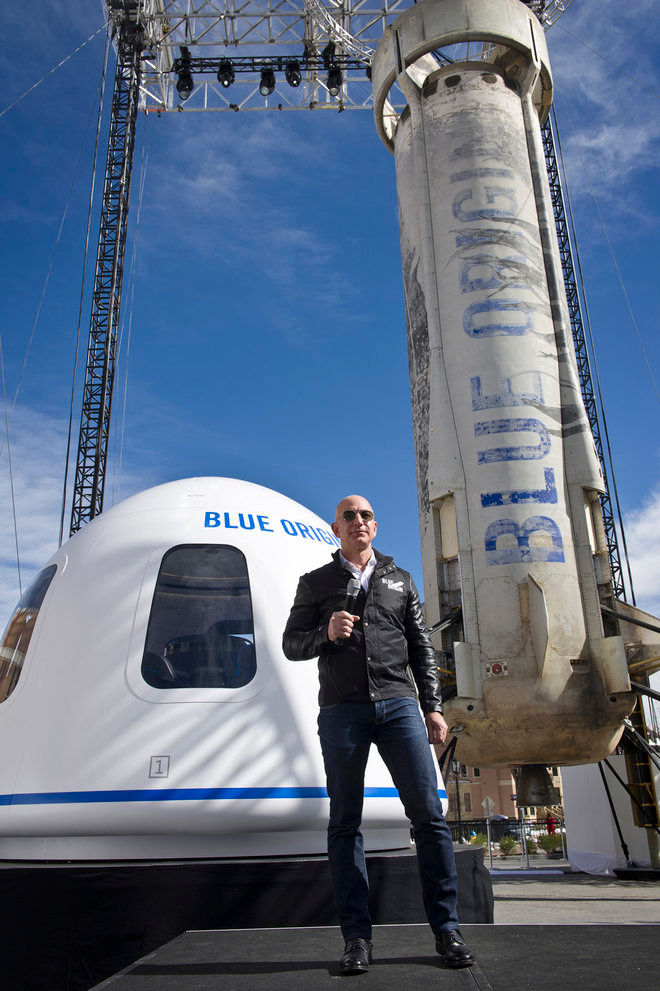Jeff Bezos says Blue Origin’s Moon colony for human settlers and heavy industry will be built within
- Ken Ecott
- Jun 1, 2018
- 3 min read

Amazon CEO Jeff Bezos’ plans to splurge some of his jaw-dropping wealth pushing his private spaceflight company Blue Origin towards the business of moon colonization—think Elon Musk’s dreams of a SpaceX-backed colony on Mars, but much less likely to get everyone involved killed.
Speaking at the Space Development Conference in Los Angeles, amazon CEO Jeff Bezos, who also runs a space agency called blue origin, detailed his plans to create a permanent settlement on the moon in the future. He wants Blue Origin to work with NASA and the ESA to test the possibilities of lunar habitation and has already proposed a public-private partnership towards the same.
Bezos wants to launch a lunar lander by 2020 and said that blue origin will not wait around if officials are delaying its plans and will carry out the processes solo if need be.

Listing the advantages of colonising the moon, Bezos said it is relatively close, has water as air and rocket propellant, has 24/7 sunlight for solar cells, and plenty of regolith.
He added that the moon is an ideal new habitat for the human race as it can be reached within a couple of days with the right rocket.
And scientists have determined that it has deposits of water ice near the poles that could be converted into drinking water, breathable air, and blaster fuel for reusable rockets, like the ones Blue Origin makes.
Blue origin essentially wants to enable lunar manufacturing. Bezos thinks that moving the heavy industry to the moon and hollowed asteroids will help conserve resources on earth, which could be reserved for "residential and light industrial" purposes in the future.
Also, Bezos apparently likes the European Space Agency’s concept of a Moon Village where all lunar outposts are concentrated in a single region for potential resource-sharing the most. As Geekwire noted, Bezos views Blue Origin as primarily about lowering the cost of cargo delivery to space rather than actually getting too deeply involved in the construction of things like habitats, so this would all set up the company nicely to be a sort of Space Amazon for said Moon Village.
For that, blue origin would deliver five tons of payload to the moon so that other private space companies can get the ball rolling.
Bezos said, "in the not-too-distant future—i'm talking decades, maybe 100 years—it'll start to be easier to do a lot of the things that we currently do on earth in space, because we'll have so much energy."
"We will have to leave this planet. We're going to leave it, and it's going to make this planet better," he added.
Bezos also emphasized on the fact that while building a "lunar village," countries will have to ensure that they work together instead of testing their strengths and competing against each other.
New Shepard flew again for the seventh time on Dec. 12, 2017, from Blue Origin’s West Texas Launch Site. Known as Mission 7 (M7), the mission featured the next-generation booster and the first flight of Crew Capsule 2.0. Crew Capsule 2.0 features large windows, measuring 2.4 feet wide, 3.6 feet tall. M7 also included 12 commercial, research and education payloads onboard.
Competitors like SpaceX and Boeing seem to have an early advantage: As TechCrunch noted, Blue Origin is still only testing sub-orbital rockets. But Bezos told Geekwire he’s liquidating $1 billion of his Amazon stock a year to fund Blue Origin, and doesn’t expect to run out of money anytime soon. In any case, these all seem like reasonable insights in how humans can achieve our deepest ambition as a species: An entire solar system filled with trillions of hastily discarded Amazon boxes.


Comments